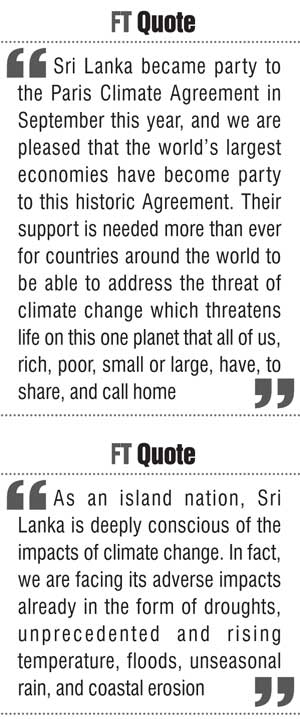Friday Feb 20, 2026
Friday Feb 20, 2026
Saturday, 19 November 2016 00:00 - - {{hitsCtrl.values.hits}}
As an island nation, Sri Lanka is deeply conscious of the impacts of climate change and facing its adverse impacts already in the form of droughts, unprecedented and rising temperature, floods, unseasonal rain, and coastal erosion, Foreign Affairs Minister Mangala Samaraweera said.
Addressing the High Level Segment of the 22nd Session of the Conference of Parties to the United Nations Framework Convention on Climate Change (COP22) in Marrakesh, Morocco on Wednesday, Minister Samaraweera said the support of world’s largest economies is needed more than ever for countries around the world to be able to address the threat of climate change which threatens life on earth.
“Our commitment to the Paris Climate Agreement is our best hope to limit rising temperatures that would otherwise have devastating consequences for future generations,” the Minister added.Sri Lanka became a party to the Paris Climate Agreement in September this year.
Elaborating on the initiatives taken by Sri Lanka, for its part, the Minister said a National Climate Change Policy, and a National Climate Change Adaptation Strategy have been formulated; and a high-level coordination body led by the President has been setup to align Sri Lanka’s policies with its international commitments on environmental issues.
Minster Samaraweera pointed out that the technology transfer from the developed to developing countries is vital in the quest to combat climate change. The world today is more conscious than ever that collective action is required to combat Climate Change and meet the Sustainable Development Goals by 2030,
he observed.
Following is the full text of Samaraweera’s speech:
At the outset, let me convey my delegation’s appreciation to the Government and the people of the Kingdom of Morocco for hosting this important conference and for the warm hospitality extended to us. Let me also convey the best wishes of my President Maithripala Sirisena.
This Conference is significant as it takes place just days after the entry into force of the Paris Agreement on Climate Change on 4 November.
As an island nation, Sri Lanka is deeply conscious of the impacts of climate change. In fact, we are facing its adverse impacts already in the form of droughts, unprecedented and rising temperature, floods, unseasonal rain, and coastal erosion.
Sri Lanka became party to the Paris Climate Agreement in September this year, and we are pleased that the world’s largest economies have become party to this historic Agreement. Their support is needed more than ever for countries around the world to be able to address the threat of climate change which threatens life on this one planet that all of us, rich, poor, small or large, have, to share, and call home.
Our commitment to the Paris Climate Agreement is our best hope to limit rising temperatures that would otherwise have devastating consequences for future generations.
Sri Lanka’s initiatives
Sri Lanka, for its part, has taken several initiatives. A National Climate Change Policy, and a National Climate Change Adaptation Strategy have been formulated; and a high-level coordination body led by the President has been setup to align our policies with our international commitments on environmental issues.
The portfolio of Environment is held by the President himself to ensure commitment, action and guidance at the highest level of Government, in fact Sri Lanka has launched several climate smart initiatives including implementing sound sustainable energy development programs and reduction of GhG emissions in five main sectors, i.e. energy, transport, industry, forest and waste.
We have also recently launched a project to conserve mangrove forests which are seen as vital resources for mitigating the effects of climate change. The President of Sri Lanka, even prior to the ratification of the Paris Agreement launched the ‘Sri Lanka next - Blue Green Era’ program last December to demonstrate our commitment to the agreement.
Technology transfer from the developed to developing countries is vital in the quest to combat climate change. Sri Lanka therefore adds its voice to those of other developing nations to urge greater access to finance including from the Green Climate Fund. Mitigation and adaptation financing and capacity building are essential and urgent.
Moreover, higher GHG emitters must assist developing countries struggling to meet development needs.
The world today is more conscious than ever that collective action is required to combat Climate Change and meet the Sustainable Development Goals by 2030.
I hope that we sustain the momentum and commitment achieved last year through the Paris Climate Agreement and the 2030 Agenda, to stay the course required to address the challenges before us collectively with due diligence and responsibility.